Can You Steam Clean Vinyl Floors?
If you have some trouble asking, “Can you steam clean vinyl floors” but can’t find a proper answer, you are not alone. Vinyl floors are a worthy budget and bring such an elegant, vintage look to your house.
The more prevalent, the more questions around how to clean them properly are raised on the Internet. You don’t need to go anywhere else; I will reveal the best answer here!

What Is Vinyl Floor?
In short, vinyl floors are types of floor covering material made from PVC (polyvinyl chloride). There are three styles of vinyl floors: vinyl plank, vinyl tile, and vinyl sheet.
Although there are many types of vinyl floor, they all share a similar layered structure: UV coat/film; transparent wear layer; decor film layer; reinforcement layer, and the base.
WPC or SPC are types of sub-categories of luxury vinyl tile (LVT); they have a slight difference at the base and reinforcement layer with the other three, making them deliver unique effects (rock-like/wood-like).

The Incredible Advantages That Vinyl Floors Offers
Vinyl floors also have many advantages, some features of them that might attract you, besides their allure looks, are:
Effortless to Install
Vinyl floors are renowned for their straightforward installation. Almost all of these can be done by yourself with vinyl planks or tiles. The only exception is vinyl sheets, which you might need professional help with due to their size.
Water-resistant
This specific type of floor is water-resistant, which means they will not be ruined by over moisturization or a lot of water. Therefore, cleaning them sounds much more accessible.
Can Be Cleaned Easily
Since they are water-resistant, you don’t have to worry about spills, stains, or almost all mold, mildew, or fleas problems.
Various Looks to Choose
Vinyl floors have various looks since their decor films have many different patterns. They can have a wood-like look, rock-like look, or many other types that you like.
Thanks to this advantage, they can become great alternatives for hardwood floors because they can stand well under humidity and replace wood floors in places like bathrooms/toilets.
Scratch-resistant (not scratch-proof)
Vinyl floors have a remarkably durable wear layer which helps them not easy to have ugly marks/scratches. Yet, if you don’t treat your floors properly, you will still ruin them.
Distinct Feel While Walking
Vinyl floors are shock-absorbent, and their layers are also varied; you can have many options for reinforcement layers and bases to increase the comfort feeling while walking.
Affordable
These floors have many advantages, and another important factor in explaining their popularity is they are absolutely affordable, compared to the other floorings like hardwood or stone.
Incredibly Durable
Vinyl floors can endure well under high traffic areas, damp places and are suitable for any part of your house. Their lifespans that most manufacturers recommend are 15 years, but they can last up to 20 years if they have good care.
General looks and information about vinyl floors you should not miss!
They have many advantages and seem like vinyl floors are unbreakable, but are they truly that tough? Can you apply any cleaning method you want on them? Let’s see now!
Then, Should You Steam Clean This Type Of Floors?
No, it is highly not recommended. One big drawback of vinyl floors, in general, is they are extrẹmely sensitive to heat (1). Direct, intense heat like hot pan, steam, or fire is obviously harmful, but did you know that even direct sunlight can negatively affect vinyl floors?
The high, sudden, concentrated heat (around 212 degrees F) will bend, warp, or create worn parts on your floors. The vinyl layer can melt, and the other layers will discolor as well. Their adhesives might also be ruined, which makes your floors start to budge.
There are some steam mop products on the market that advertise their ability to work on vinyl floors. If you want to consider buying these products, make sure to check your floor’s warranty policy so that you don’t accidentally void it.
If it’s not a good idea to tidy up vinyl floors with steam cleaners, what should you do to keep your floor spotless? Check out the following sections and find out!
Daily Maintenance (Sweeping And Vacuuming)
The first method to keep your vinyl floor clean is dry cleaning with sweeping and vacuuming. Applying this way is effortless, and you can do it almost anytime you see trash and dirt piling up on your floor.

What to Have:
- Broom (softer bristles)/mop (dry mop, flat mop, dust mop)
- Vacuum cleaner (no beater bar, “bare floor” mode on, with hose attachment)
How to Do:
Step 1: Quickly sweep out the debris, particles, dust on your floor.
If you leave them there and ignore cleaning them up, these particles can create permanent scratches on the floors.
Step 2: Use the vacuum cleaner with my suggested setting above.
Following the suggested settings (no rotating brush/beater bar or use only hose attachment) strictly to avoid any unwanted permanent damage. Continue vacuuming all over the floors until the result satisfies you.
To vinyl plank or tile, don’t forget to vacuum the gaps or edges; the dust/dirt might be stuck there, too.
Spot Cleaning – Things You Must Do
Even though you are super careful, accidents will always happen. Stains, marks, or spills are inevitable with vinyl floors; just see how to clean those things off.
1. Lemon
Let’s start with something natural first! Acid citric contents in lemon can help you with easy stains (grass stains) or mild discoloration.

You will Need:
- A half of a lemon
- Clean, dry, soft cloths
- Warm water
How to Do:
Step 1: Blot/wipe the running liquid first.
Step 2: Use the lemon half and rub it on the stain; continue rubbing for several minutes.
Step 3: Rinse the lemon off with a damp cloth (+warm water).
Step 4: Use another dry cloth to blot up all the excess moisture on your floors.
If the stain is stubborn, you can re-do this method with the leftover half of your lemon or refer to the other methods below.
2. Baking Soda
This instruction is the perfect savior to clear up regular spills like wine, juice, food, or grease stains.

You Need to Prepare:
- Soft, white cloths (to prevent color bleeding)
- Baking soda
- Water
Solution mix: Use 1 cup of baking soda with 1 cup of water and mix them well until the mixture has a paste-like texture.
Note: You can follow the 1:1 ratio and adjust the volume based on the stains you have to deal with.
How to Clean:
Step 1: Use the soft cloth to remove any running liquid on the floor, ensuring it’s as dry as possible.
Step 2: Put the paste onto the stain directly.
Step 3: Gently scrub the stains with another soft cloth.
Step 4: Continue using another clean cloth to take off the excess baking soda on the floors after cleaning.
3. Rubbing Alcohol (For Makeup/Ink Spills)
Specially used for makeup/ink spills, you can use rubbing alcohol to quick-clean these types of spills.

Things You Will Need:
- A soft cloth
- Rubbing alcohol (acetone-free nail polish)
You Should Do:
Step 1: Dampen the white cloth with a bit of rubbing alcohol.
Step 2: Simply wipe the spills off your floors. The alcohol helps to remove the tint from those so that you can take the spill out effortlessly.
Note: If your spill is a polish, take your acetone-free nail polish and do the same as the above instruction.
4. Mild Detergent/Dish Soap

Detergents or dish soaps are versatile and work quite well in cleaning dirty spots. Here is what you need in this case:
- Warm water
- Mild detergents/dish soap/ floor cleaning formulated for vinyl floors
- 1 cup of white/apple cider vinegar (optional)
- A clean sponge
Solution mix: Stir a few drops of soap with warm water until the mixture is bubbling.
Alternative mix: Mix well 1 gallon of warm water with 1 cup of white/apple cider vinegar. (Adjust the amount based on this ratio)
Notes: Don’t use a scouring pad since it will harm your floors. Don’t try the alternative mixture on no-wax vinyl floors; it will make your floors look dull.
How to do:
Step 1: Dampen the sponge with the solution mix.
Step 2: Gently rub the stains until you are satisfied with the outcome.
Step 3: Dampen your sponge with water again and take out the excess solution.
5. WD-40 Or Jojoba Oil (For Scuff Mark)
This type of mark is oil-based and requires a bit of a different way to deal with. Now you should find something like these:
- WD-40/jojoba oil
- Soft, white cloth

Jojoba oil is actually an effective cleansing oil and also doesn’t irritate your skin. (2)
How to do:
Step 1: Dampen a small part of your cloth and gently scrub the marked area on the floor. If you are lucky and the mark is new, it will fade away quickly.
Step 2: Continue to rub if the mark is stubborn and stop when you think it has gone.
6. Bleach
Bleach is quite risky to be used on vinyl floors; therefore, you need to be extra careful with this solution or only use it when there is no other way.

What You Need:
- 1 tbsp of bleach
- 4 tbsps of clean water
- White cloths
Solution mix: Combine 1 tablespoon of bleach with 4 tablespoons of clean water.
You can follow the 1:4 ratio to increase the amount of solution if there are many stains.
Notes: Since using this bleach-water mix is quite risky; you can do a small test on an inconspicuous area of your floors to see their reactions. You have to make sure the ventilation is excellent and completely remove all the residue after cleaning.
Step-by-step to do:
Step 1: Dampen the cloth with the bleach mixture.
Step 2: Let the damp cloth cover the stain for around 1 hour. You need to re-check the status of the stubborn stains several times to ensure that they are gone or not yet.
Step 3: Take the cloth out right away when you see there is no trace left. The longer you put the bleach mixture on the floors, the higher risk that your floors will be bleached too.
Step 4: Rinse the area thoroughly with water.
In case after 1 hour and the stains still don’t go away, you can re-do all the steps once again.
Instructions For Thoroughly Clean Your Vinyl Floor With A Mop
If you want to clean your whole floor at a time, using a mop is the most convenient and effective way. I suggest you mop your vinyl floors once every week, and here is my guide on how to do it you should see.

What to Have:
- Broom/Vacuum cleaner (no beater bar, “bare floor” mode on, with hose attachment)
- Clean mop
- Clean fabric cloths
- Melamine sponge
Cleaning Solutions:
- Option 1: ½ cup of rubbing alcohol + 1 cap-full of multi-surface cleaner + water
- Option 2: A few squirts of apple cider vinegar + water + a few drops of essential oil (brings back the shiny look and refreshing feel)
- Option 3: Dish soap (neutral pH) + warm water (severely dull floors)
Choose one of these solution mixtures above, blend them well up before cleaning your vinyl floors.
How to Do:
Step 1: Sweep or vacuum your floor before applying any moisture on your floors.
You might not want to see soapy liquid blend with dust and create marbling on your floors.
Step 2: Dampen the clean mop with the cleaning solution, wring out the excess water and ensure that your mop is not watery before cleaning.
Step 3: Rub the floor gently with the damp mop.
Step 4: Rinse the solution mix out.
Step 5: Let your floor dry.
Note: Mopping your floors is good, but don’t do it too often. The excess water over time can creep into the edge and ruin the gluing. You can do this cleaning method weekly or monthly, but remember, don’t overdo it when your floors don’t need it.
For daily cleaning, try sweeping or vacuuming instead.
This is how to clean your vinyl floor like a professional!
Things You Should And Should Not Do To Protect Your Synthetic Floors
Vinyl flooring seems perfect and easy to preserve its pristine condition over time, but nothing can last forever, especially if you don’t give it good care. You should notice a few things when using it, and you can refer to them below.

Do’s:
If you want to extend the lifespan of your floors, you should refer to these suggestions below:
- Regular quick clean your floors by vacuuming or sweeping
These ways help maintain the cleanliness on the surface of your vinyl floors and preserve their pristine shiny look. Who wants to see soiled, dirty floors day by day, right? - Remove the spills quickly
Vinyl floors are indeed water-resistant and hard to be stained; leaving the spills without caring or cleaning them up can still create stain marks. The running liquid from spills can also severely affect the gluing and leave unpleasant odors. - Opt for vinegar, baking soda paste, or vinyl-floor-compatible cleaner to keep your floor spotless
To avoid losing the luxury look of your floors, using something light and suitable cleaners with vinyl floors is the best! - Protect your floors from direct sunlight
Vinyl floors are sensitive to heat, and the heat from direct sunlight is not exceptional. Therefore, to protect the luxurious, elegant look of your floor, try to shade the area with curtains, closing the door and window if it’s a heavy sunny day. - Use felt pads or rugs/carpets/mats to avoid direct contact with heavy furniture, foot-force, pets’ claws, and so on.
These tools will prevent unwanted scratches or dents from the furniture legs or anything like your foot-fall, claws. I suggest using rugs/carpets/mats to cover your floors in high-traffic areas since they will be both protectors and lovely decorations.
And never forget to use doormats; most of the dirt in your house comes from your shoes. Make sure to take the soil, water, debris out of your shoes with the mats before stepping on your floors.
Some tips for maintaining the vinyl floors you should never ignore.
Don’ts:
You should avoid doing the following things with your vinyl floors.
- Soaking up your floor
Vinyl floors are renowned for their water-resistant characteristic, but their adhesives are not. Using too much water or a large amount that you cannot control can make some of it creep down to the edges and destroy the gluing after time. - Walk on un-covered floors with dirty shoes
You need to know that your shoes are super dirty; the soles are loaded with dirt and debris/particles that can smudge your floor and create ugly scratches. - Use abrasive cleaners or bleach, ammonia chemicals in cleaning
Cleaners that can abrade or bleach will ruin the shine-look on your vinyl floor. Acetone can also cause adverse effects on this type of floor, so watch out! - Applying wax on your vinyl floors
Don’t mistake vinyl floors for linoleum floors; the vinyl doesn’t need wax. Trying to apply wax on your vinyl floors will make them become dust-magnets and get loaded with dirt easier. - Use a stiff nylon brush, hard tile mop, steel wool, or cleaning utensils that are stiff and edgy.
The edge might scratch your floors’ surface, and they will lose their shiny look. If you want to scrub them, using the soft mop or soft utensils will be better.
Suppose; try there is something hard to remove on the floor, try to dampen the dirty area with the cleaner mix until it is softened. After that, mix and wipe with a soft cloth.

FAQs
If you have any other concerns about cleaning vinyl floors, the answers to frequently asked questions here can help you with that.
Other Than Steam Clean, Let’s Clean Your Vinyl Floors The Other Ways
Hoping that you have found the perfect way to deal with your vinyl floor cleaning concerns. Although you cannot steam clean your vinyl floor, other methods I have suggested are helpful, and you should also try them once. It will never upset you!
After trying, please leave me a comment below and share your experience with the method you have chosen. I would love to hear your feedback. And if you love my recommendations, please share them with your family and friends. Loving is sharing!

References
- staff, F.,. How Does Heat Affect Vinyl Floors? – Flooristics.
- The Original Jojoba Company.. Jojoba Oil Cleanser | Jojoba Oil Cleansing | Cleansing With Jojoba.

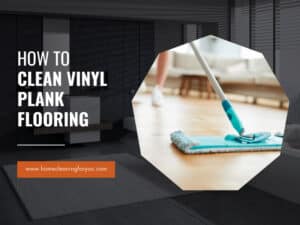
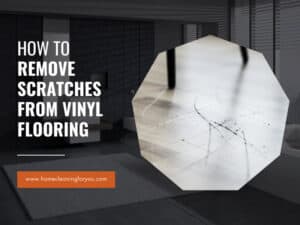
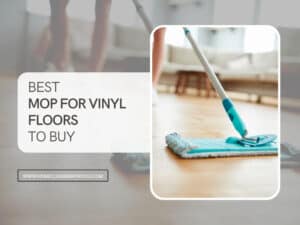
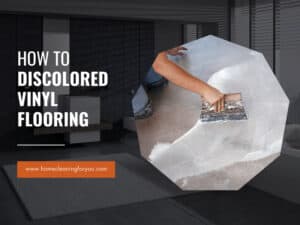
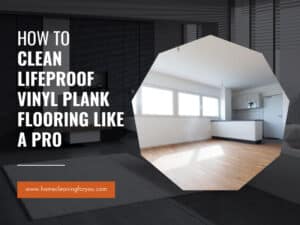
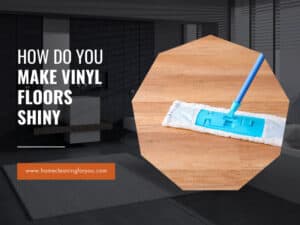
Samantha Lee
Head Cleaning Expert
Expertise
Professional Home Cleaning, Green Cleaning Techniques, Stain Removal & Fabric Care, DIY Home Maintenance & Organization, Sustainable Cleaning Products, Home Care for Busy Lifestyles
Education
University of Denver
Samantha Lee is the Head Cleaning Expert at HomeCleaningForYou.com, specializing in eco-friendly home care. She holds a Bachelor of Science in Environmental Science from the University of Denver, focusing on sustainable cleaning solutions.
With expertise in green cleaning, stain removal, and DIY home maintenance, she helps homeowners keep their spaces fresh and chemical-free. Samantha has been featured in lifestyle publications and has partnered with brands promoting natural cleaning products.
She also shares practical tips through her blog, online courses, and workshops. Passionate about sustainability, she enjoys testing new eco-friendly cleaning methods and spending time outdoors.